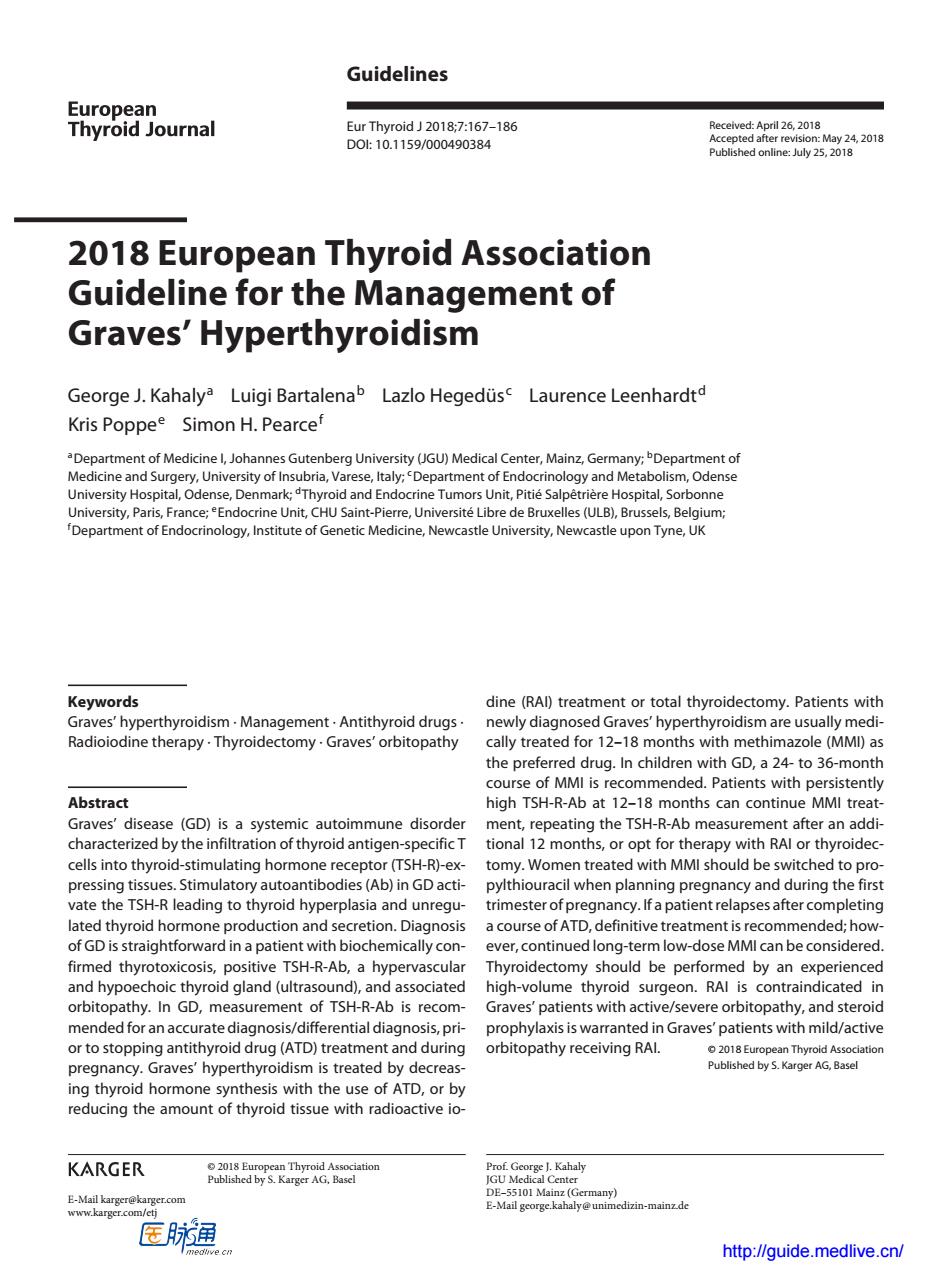正在加载图片...

Guidelines European Thyroid Journal Eur Thyroid J2018;7:167-186 Received:April 26,2018 D0t10.1159/000490384 2018 European Thyroid Association Guideline for the Management of Graves'Hyperthyroidism George J.Kahalya Luigi Bartalenab Lazlo Hegedus Laurence Leenhardt Kris Poppee Simon H.Pearcet Department of Medicine l,Johannes Gutenberg University (JGU)Medical Center,Mainz,Germany;Department of Medicine and Surgery,University of Insubria,Varese,Italy:Department of Endocrinology and Metabolism,Odense University Hospital,Odense,Denmark:Thyroid and Endocrine Tumors Unit,Pitie Salpetriere Hospital,Sorbonne issels.Belgium Newcastle University,Newcastle upon Tyne,UK Keywords dine(RAl)treatment or total thyroidectomy.Patients with Graves'hyperthyroidism-Management.Antithyroid drugs newly diaanosed graves hyperthvroidism are usually medi Radioiodine therapy.Thyroidectomy.Graves'orbitopathy cally treated for 12-18 months with methimazole(MMI)as the preferred drug.In children with GD,a 24-to 36-month course of MMI is recommended.Patients with persistently Abstract high TSH-R-Ab at 12-18 months can continue MMI treat- Graves'disease (GD)is a systemic autoimmune disorder ment,repeating the TSH-R-Ab measurement after an addi characterized by the infiltration of thyroid antigen-specific T tional 12 months,or opt for therapy with RAl or thyroidec- cells into thyroid-stimulating hormone receptor(TSH-R)-ex- tomy.Women treated with MMI should be switched to pro- pressing tissues.Stimulatory autoantibodies(Ab)in GD acti- pylthiouracil when planning pregnancy and during the first vate the TSH-R leading to thyroid hyperplasia and unregu- trimester of pregnancy.If a patient relapses after completing lated thyroid hormone production and secretion.Diagnosis a course of ATD,definitive treatment is recommended;how- of GD is straightforward in a patient with biochemically con- ever,continued long-term low-dose MMI can be considered. firmed thyrotoxicosis,positive TSH-R-Ab,a hypervascular Thyroidectomy should be performed by an experienced and hypoechoic thyroid gland (ultrasound),and associated high-volume thyroid surgeon.RAI is contraindicated in orbitopathy.In GD,measurement of TSH-R-Ab is recom- Graves'patients with active/severe orbitopathy,and steroid mended for an accurate diagnosis/differential diagnosis,pri- prophylaxis is warranted in Graves'patients with mild/active or to stopping antithyroid drug(ATD)treatment and during orbitopathy receiving RAl. 2018 European Thyroid Association pregnancy.Graves'hyperthyroidism is treated by decreas- Published by S.Karger AG,Basel ing thyroid hormone synthesis with the use of ATD,or by reducing the amount of thyroid tissue with radioactive io- KARGER R0saRTrdatia 岂 医脉通 http://guide.medlive.cn/Guidelines Eur Thyroid J 2018;7:167–186 2018 European Thyroid Association Guideline for the Management of Graves’ Hyperthyroidism George J. Kahalya Luigi Bartalenab Lazlo Hegedüsc Laurence Leenhardtd Kris Poppee Simon H. Pearcef aDepartment of Medicine I, Johannes Gutenberg University (JGU) Medical Center, Mainz, Germany; bDepartment of Medicine and Surgery, University of Insubria, Varese, Italy; cDepartment of Endocrinology and Metabolism, Odense University Hospital, Odense, Denmark; dThyroid and Endocrine Tumors Unit, Pitié Salpêtrière Hospital, Sorbonne University, Paris, France; eEndocrine Unit, CHU Saint-Pierre, Université Libre de Bruxelles (ULB), Brussels, Belgium; f Department of Endocrinology, Institute of Genetic Medicine, Newcastle University, Newcastle upon Tyne, UK Received: April 26, 2018 Accepted after revision: May 24, 2018 Published online: July 25, 2018 Prof. George J. Kahaly JGU Medical Center DE–55101 Mainz (Germany) E-Mail george.kahaly@unimedizin-mainz.de © 2018 European Thyroid Association Published by S. Karger AG, Basel E-Mail karger@karger.com www.karger.com/etj DOI: 10.1159/000490384 Keywords Graves’ hyperthyroidism · Management · Antithyroid drugs · Radioiodine therapy · Thyroidectomy · Graves’ orbitopathy Abstract Graves’ disease (GD) is a systemic autoimmune disorder characterized by the infiltration of thyroid antigen-specific T cells into thyroid-stimulating hormone receptor (TSH-R)-expressing tissues. Stimulatory autoantibodies (Ab) in GD activate the TSH-R leading to thyroid hyperplasia and unregulated thyroid hormone production and secretion. Diagnosis of GD is straightforward in a patient with biochemically confirmed thyrotoxicosis, positive TSH-R-Ab, a hypervascular and hypoechoic thyroid gland (ultrasound), and associated orbitopathy. In GD, measurement of TSH-R-Ab is recommended for an accurate diagnosis/differential diagnosis, prior to stopping antithyroid drug (ATD) treatment and during pregnancy. Graves’ hyperthyroidism is treated by decreasing thyroid hormone synthesis with the use of ATD, or by reducing the amount of thyroid tissue with radioactive iodine (RAI) treatment or total thyroidectomy. Patients with newly diagnosed Graves’ hyperthyroidism are usually medically treated for 12–18 months with methimazole (MMI) as the preferred drug. In children with GD, a 24- to 36-month course of MMI is recommended. Patients with persistently high TSH-R-Ab at 12–18 months can continue MMI treatment, repeating the TSH-R-Ab measurement after an additional 12 months, or opt for therapy with RAI or thyroidectomy. Women treated with MMI should be switched to propylthiouracil when planning pregnancy and during the first trimester of pregnancy. If a patient relapses after completing a course of ATD, definitive treatment is recommended; however, continued long-term low-dose MMI can be considered. Thyroidectomy should be performed by an experienced high-volume thyroid surgeon. RAI is contraindicated in Graves’ patients with active/severe orbitopathy, and steroid prophylaxis is warranted in Graves’ patients with mild/active orbitopathy receiving RAI. © 2018 European Thyroid Association Published by S. Karger AG, Basel http://guide.medlive.cn/